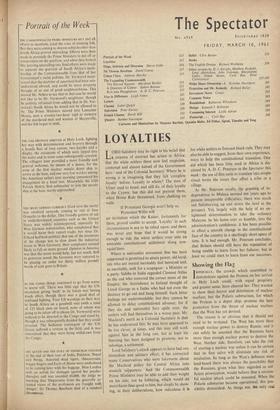LOYALTIES
LORD Salisbury may be right in his belief that a miasma of mistrust has arisen in Africa; that the white settlers there now feel suspicion, contempt and almost hatred of the Government here—and of the Colonial Secretary. Where he is wrong is in imagining that they felt 'complete loyalty' before. Loyalty to whom? The men of Ulster used to boast, and still do, of their loyalty to the Crown; but this did not prevent them, when Home Rule threatened, from chalking on walls If Protestant Georgie won't help us,
'Protestant Willie will an invitation which the Kaiser, fortunately for them, proved unable to accept. 'Loyalty' in such circumstances is not to be relied upon; and there was never any hope that it would be strong enough to tide the white settlers over into an amicable constitutional settlement along non- racial lines.
Where a nationalist movement that has been suppressed is permitted to attain power, old loyal- ists who are ousted inevitably feel betrayed and, as inevitably, seek for a scapegoat : a Minister or a party. Sahibs in India regarded Clement Attlee as the cad who removed the corner stone of the Empire; the Ascendancy in Ireland thought of Lloyd George as a Judas who had not even the decency to go out and hang himself. Such bitter feelings are understandable; but they cannot be allowed to delay constitutional advance, for if they do, and nationalist fury spills over, the settlers will find themselves in a worse pass. Mr. Macleod's merit as a Colonial Secretary is that he has understood this; he may have appeared to be too clever, at times, and this may still work against him in the long run, but at least his finessing has been designed to promote, not to sabotage, a settlement.
Lord Salisbury's attack appears to have had one immediate and salutary effect; it has converted many Conservatives who were lukewarm about the Macleod policy for Central Africa into staunch apporters. And the Commonwealth Prime Ministers may be able to add their weight on his side; not by lobbying, which would do more harm than good to him, but simply by show- ing, in their deliberations, how ridiculous it is for white settlers to forecast black ruin. They may also be able to suggest, from their own experience, ways to help the constitutional transition. One aid which has been little used in Africa is dis- cussed by A. D. C. Peterson in the Spectator this week : the use of film units to translate into simple visual terms the issues that affect a tribe or a village.
As Mr. Peterson recalls, the granting of in- dependence to Malaya seemed ten years ago to present insuperable difficulties; there was much sad Salisburying up and down the land at the prospect. Yet, largely with the help of an en- lightened determination to take the ordinary Malayan, be his home ever so humble, into the administration's confidence, it has been possible to effect a smooth change in the constitutional face of the country in a startlingly short space of time. It is bad enough, Mr. Peterson concludes, that Britain should still have the reputation of being unable to learn from her failures; but at least we could start to learn from our successes.






































 Previous page
Previous page